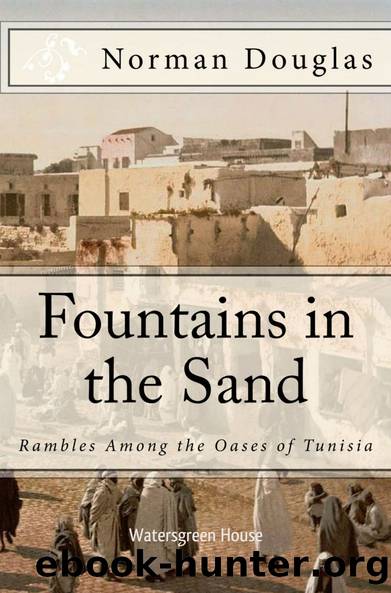Fountains in the Sand by Norman Douglas

Author:Norman Douglas [Douglas, Norman]
Language: eng
Format: epub
ISBN: 9780436132056
Google: nrs1AQAAMAAJ
Publisher: Secker & Warburg
Published: 1985-01-15T00:17:43+00:00
"By the way, how does it come about that you, being a Pole, should have a
Russian family name?"
The question seemed to astonish and perplex him. At last he said:
"Oh, it's about the same thing, isn't it? Nowadays, I mean," he added, with grandiloquent pathos, "ever since the misfortunes of my unhappy country."
At the entrance to the town we separated, and I watched for some time his bowed form as it crept along the wood-market in the direction of the Kairouan road.
This is one of the figures that will persist in my mind very clear and pathetic, and I shall long remember those plaintive remarks about poverty that welled up, surely, from the bottom of his heart. How far, I wonder, is such a man the author of his own calamities, and how far have they made him? Academic questionings, based on out-of-date philosophy! Our vices, he said, are distilled for us beforehand in the dim laboratory of the past. His vice, evidently, is to hate work of every kind; his faculties, therefore, never undergo the rhythmic joy of reaction, for he is too well nourished to live the vita minor of a starveling, to endure Arab acquiescence in non-production.
"I am only trying to explain myselfâto myself." Half-truth, I imagine. He is probably conscience-stricken, or at least dissatisfied with his conduct for one reason or another, and endeavouring to justify some base plan of action by re-stating ethics in terms of hunger; a specious line of argument, since hunger is not the rule but the exception.
And then I shall think of his red nose and watery little eyes, his absurd jewelleryâa fine presence, none the less, when he pulls himself together; there is about him an air of faded distinction that softly symbolizes the history of his adopted country.
The Count!
Why a count? Because all Poles are countsâthose that are not princes. But why a Pole? Well, perhaps from the convenience of vagueness, inasmuch as there is something international about a Poleâinternational, and yet neither equivocal nor vulgar; every one sympathizes with them, for they all possessed, once upon a time, vast estates whose loss is borne in cheerful resignation, and never so much as alluded to; they know everybody, and everybody worth knowing is related to them, by marriage or otherwise, in this or some other century; as men of the world, they are ready to talk upon any subject with tolerance, geniality and a pleasingly personal note that withers up the commonplace, smoking, meanwhile, innumerable cigarettes out of mouthpieces which display a complex escutcheon contrived in gold and rubies upon the amber surface. Yes, his choice was good: Poles are gentlemen. But why caricature them? And why, above all things, select an inappropriate Muscovite name? That argues a lack of general intelligence and might easily spoil everything; so true it is, as a legal friend once observed to me, that "it takes a wise man to handle a lie. A fool had better remain honest."
What can be the meaning of this unlovely comedy? Some defalcation or forgery? Likely enough.
Download
This site does not store any files on its server. We only index and link to content provided by other sites. Please contact the content providers to delete copyright contents if any and email us, we'll remove relevant links or contents immediately.
In the Track of the Trades by Lewis R. (Lewis Ransome) Freeman(51)
From Peking to Mandalay by Johnston Reginald Fleming Sir(46)
A Journal of the Disasters in Affghanistan, 1841-2 by Florentia Wynch Sale(42)
Missing on Maui by Kassandra Lamb(42)
Fountains in the Sand by Norman Douglas(41)
The Land Beyond the Forest by E. (Emily) Gerard(41)
The Dictator's Highway by Justin Walker(40)
In Troubadour-Land by S. (Sabine) Baring-Gould(39)
Travels in Southern Europe and the Levant, 1810-1817 by unknow(39)
Letters to a Friend, Written to Mrs. Ezra S. Carr, 1866-1879 by John Muir(34)
Sketches of Central Asia (1868) by Ármin Vámbéry(31)
Tent Work in Palestine by C. R. (Claude Reignier) Conder(30)
The Mystery of the Anasazi Civilization by Sam Osmanagich(30)
Missing on Maui: A Kate on Vacation Mystery (The Kate on Vacation Mysteries Book 4) by Kassandra Lamb(26)
Oxbells and Fireflies by Ernest Buckler(24)
The WPA Guide to Colorado by Federal Writers' Project(23)
Frommer's Eastern Europe by Baker Mark(16)
BY Austen H. Layard - Discoveries in the ruins of nineveh and babylon . part 1 by 1853(10)
Circular Letter No. 4256 - Communication from the Government of the Republic of Maldives by Redistributed by Regs4ships Ltd(10)
